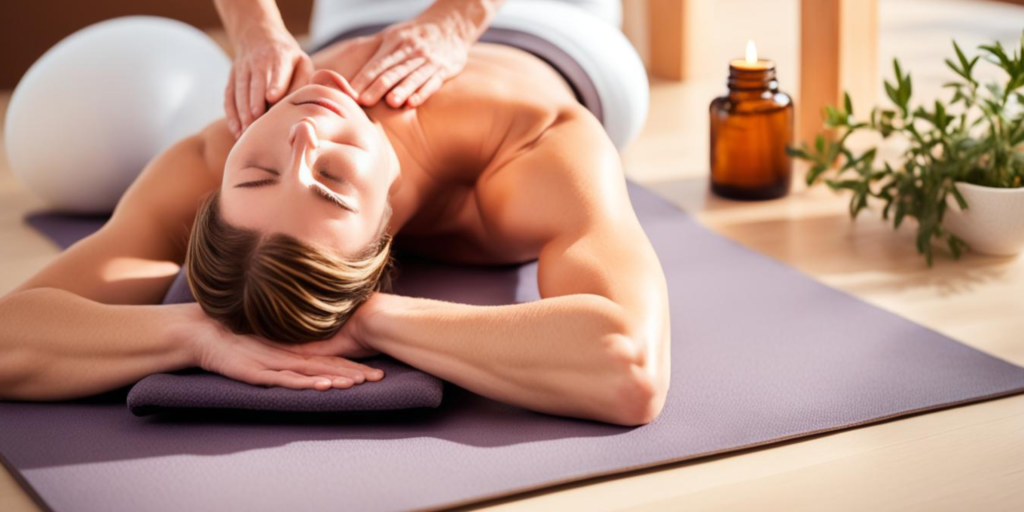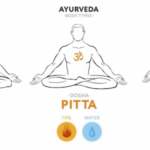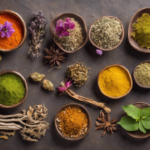“Perfect Dosha Balance” If we all went to a big buffet in Las Vegas, we wouldn’t pick the same foods. This shows how different we are. As our food choices vary, our health needs are unique too. Ayurveda offers special daily practices. Perfect Dosha Balance help keep us healthy and strong.
Ayurveda has great self-care steps. They focus on Perfect Dosha Balance. Most of them help with a certain dosha, but the last ritual is good for all.

The Importance of Ayurvedic Rituals
Our lives today are very busy. We often feel tired and overwhelmed. Ayurveda is an old Indian system of medicine. It tells us to slow down. Doing daily rituals can make us feel better in body, mind, and spirit.
Connection to Nature
Ayurvedic rituals connect us with nature. We follow nature’s rhythm and feel calm. We learn to care for the Earth and realize we’re all connected. This makes us cherish everything around us.
Balancing the Doshas
Ayurveda says there are three kinds of people: Vata, Pitta, and Kapha. Each has its traits that affect health. Ayurvedic rituals keep these traits in balance. They make us full of life and health.
Ayurveda stresses the need for a delicate balance. This balance is between mind, body, and spirit. It is key to health and wellness.
Doing Ayurvedic rituals brings balance. It also brings peace to our lives. These ancient practices help our body, mind, and spirit. They make us strong enough to handle today’s challenges.
Tongue Scraping
Tongue scraping is from Ayurveda, an old way to stay healthy. I scrape my tongue every morning. Sometimes, I do it again in the evening. At first, it confused me. But I soon saw the big deal in Ayurveda about caring for your tongue.
In Ayurveda, we check the tongue to see signs of health. It can show if something is wrong in the body. Aside from that, taking care of your tongue helps take care of the rest of you. Scraping your tongue helps with digestion. It also fights bad breath. It also lowers the risk of gum disease and blood infections.
Benefits for Overall Health
Tongue scraping is easy and it’s good for you in many ways.
- The tongue gathers mucus, food bits, and bacteria. These harm one’s health by building up. Scraping them out removes them.
- It improves digestion. It helps the gut work better. This makes food easier to absorb.
- It reduces bad breath: Scraping cleans off the stuff that causes it’s.
- It lowers the risk of gum disease: it’s cuts the chance of getting gum disease. It does this by removing harmful bacteria.
- It prevents infections. Bacteria from the tongue can cause them. Scraping stops this.
The best scrapers are gold, silver, copper, tin, brass, or stainless steel. Gentle scrapes from the back to the front, seven to fourteen times, work best. Don’t scrape too hard to avoid gagging.
Many people think that tongue scraping and healthy foods excite organs. They improve digestion and cleanse the body. They do this by removing toxins and bacteria from the mouth.
So, start or keep up your tongue scraping every day. It’s a small but great way to look after your health.

Self-Massage (Abhyanga)
In Ayurveda, self-massage is a daily practice. It is special. It’s known as abhyanga. I, a practitioner, always do abhyanga. I love making special abhyanga oils. This practice makes me feel like I’m doing art and science. Now, I can mix oils for any special need. It’s like creating a unique oil for everyone. When I started, I made these special oils for my clients.
Abhyanga is a daily Ayurvedic self-massage. It helps avoid extra vata, aging, and too much tiredness. In the morning, rubbing oil on your body can remove tension. It makes your skin stronger. Also, it helps your nerves and your blood flow better.
Using oils like almond, sesame, or avocado is great for this. They keep you warm and moisturize your skin. And, don’t forget to use some pressure while massaging. This way, it’s a great self-care practice.
People see Abhyanga as a way to reduce stress. They regard it as a routine task. It’s helpful in maintaining a healthy balance of mind, body, and spirit.
Ayurveda believes in using oils that fit each person. The oil should feel nice and not too messy. Self-massage can include touching your head or ears too. Doing this can help with noise in your ears, vata issues, and it’s ear health.
First, do some relaxation and take deep breaths. Then, start your self-massage. Choosing the right oil is important. It depends on where you live, the time of year, your age, and how you feel.

How often you do abhyanga depends on your dosha. People with a lot of vata should do it more than others. This practice is amazing for many reasons. It nourishes your whole body. It fights aging, making you feel rejuvenated. It helps your body to clean out waste better. It induces a profound slumber.
Mindful Eating and Drinking
When we talk about Ayurvedic eating and drinking, we look at each person’s needs. Ayurveda says we each have a special “dosha” (Vata, Pitta, Kapha). Knowing our dosha helps us pick foods that make us healthy.
Individualizing Your Diet
Ayurveda teaches that not everyone should eat the same way. What’s called “healthy” in the news is different for each of us. I cook and live according to my Vata-Pitta body constitution.
For me, using oils like olive, avocado, and ghee helps. It’s good for Vata. It is also important to add ginger and digestive spices to meals. My kids see me eating cooked veggies now, not salads or nuts. I savor each bite, letting the flavor unfold on my palate. I’ve learned a lot from Ayurveda. It’s transformed my habits in a positive way.
Six Tastes Principle
Ayurvedic meals should have all six tastes in them. Having all the flavors keeps our body in balance. But it’s how much of each taste we need that changes for each person.
Ayurveda also tells us to eat fresh, local foods that are in season. This way, we’ve matched our diet with the time of year and get the best nutrition.
By following Ayurvedic ways of eating and drinking, we learn what’s best for our body. This helps us stay healthy and feel good. If you want to cook for your Vata dosha, check out our guide.
Perfect Dosha Balance
Understanding Your Dosha
Balanced doshas are key in Ayurvedic wellness. First, you need to know your dosha – Vata, Pitta, or Kapha. Each one has its own needs and qualities, so it’s vital to personalize your self-care.
The Ayurvedic system sees three doshas – Vata, Pitta, and Kapha. They are unique energies. They affect your body, feelings, and thoughts. Your dosha, your prakriti, is set when you’re conceived. It shows your natural tendencies. It also shows possible imbalances.
Vata people are creative and quick to act. Yet, they might get cold. They won’t go to the bathroom often. They could feel nervous. Pitta folks are sharp and have a good stomach. But, they might get skin issues. They experience emotional turmoil and physical depletion. Kapha is linked to stability. But, if it’s off, it might lead to gaining weight, feeling lazy, and having lung problems.
Knowing your dosha starts you on the path to balance. You can stay balanced and do well. The key is choices like the right food, lifestyle, and self-care. Ayurveda suggests a full plan. It covers eating with the season and specific yoga for your dosha. This plan leads to a complete, centered life.

When the doshas are in balance, the body, mind, and consciousness work well. This balance is the foundation for good health. It also leads to happiness and fulfillment.” – Dr. Vasant Lad, Ayurvedic physician and author
Daily Meditation
Every daily Ayurvedic Dhyana is great for making our doshas even. These are key energies for our body and mind’s health. It involves watching your breath. You must stay mindful. This method is an old way to make your mind peaceful. It lowers stress and helps your body work well.
Pranayama Breathing Techniques
In Ayurvedic meditation, pranayama is a big thing. These breath exercises help our life force. We call our life force prana. It moves right into our body. Here are some ways to do it:
- This exercise is called Alternate Nostril Breathing. It is also called Nadi Shodhana. You breathe in each nostril to balance Ida and Pingala.
- Ujjayi Breath: It’s like a gentle ocean in your chest. This calms you down and helps you meditate.
- Bhastrika Breath: A fast and strong breath to perk up your body and mind.
Doing these breath practices with your meditation helps you align. It helps you to align with the doshas of nature. This brings you more balance and health.
Meditation is not about change. It’s not about becoming someone else. Not a new person. Nor a better person. It is about training to be aware. It is also about getting a healthy perspective. You’re not trying to turn off your thoughts or feelings. You’re learning to watch them without judgment. You must let them pass.” – Sharon Salzberg
It’s good to do Ayurvedic meditation when night is turning to day and day is turning to night. These times connect you with nature’s perfect order.
No matter if you’re a beginner or a pro in meditation. Adding Ayurvedic ways can change your life. Listening to this old wisdom brings you peace. This allows you to deeply understand the natural world.
Ayurvedic Morning Routine
Ayurveda is an old Indian way of life. It talks about how a good morning routine is key. This helps us match with nature’s flow, making us feel more balanced and full of life. The Ayurvedic morning routine is called Dinacharya. It helps keep us in top shape. This includes our body, mind, and spirit.
Waking Up Early
Ayurveda says we should wake up before the sun. This is when the sattvic (pure) nature is strong. The time between 4 am and 6 am is perfect for waking up. It’s when our body and nature’s rhythms get in tune, bringing clarity and peace.
Cleansing Practices
- Splash cool water on your face. It will wake you up and make you alert.
- Rinse the mouth with warm water. This cleans the mouth and aids digestion.
- Scrape the tongue with a metal cleaner. This removes toxins and bacteria. It improves oral health.
- Use Neti (nasal irrigation). Use it with saltwater. It clears the sinuses. It also soothes respiratory irritation.
- Massage the body with oils specific to the dosha. Use sesame oil for Vata or coconut oil for Pitta. This will nourish the skin and boost circulation.
These cleaning steps make us feel ready for the day. They make our senses come alive, help with digestion, and prepare us well.

Ayurveda says you must scrape your tongue daily. Use a metal tongue cleaner to wake up the digestive system.
Doing these Ayurvedic morning steps helps us. They help us feel balanced. It also makes us feel alive. It also helps us sync with nature’s rhythms. They find that their workouts get better. Their choices also get better. They start following routines that fit their dosha. The routines match their needs.
Herbal Remedies
Herbs are vital in Ayurvedic wellness. They help in keeping us healthy and in balance. Certain herbs work well. These include ashwagandha, shatavari, and turmeric. It’s especially well for women.
Adaptogenic Herbs: Fortifying Resilience
Adaptogens are special herbs that help us deal with stress. They make our bodies and minds stronger. It’s Ashwagandha that is a top herb for staying calm and balanced.
Hormone-Balancing Herbs: Nurturing Feminine Vitality
Some herbs are great for balancing hormones. Shatavari helps women’s health a lot. And turmeric is great for the body’s balance. Adding these herbs to our routine keeps us healthy.
Ayurvedic herbs can be your friends on a journey to better care for yourself. They help not only the body, but also the mind and spirit. Try them and see the great things they can do for you.

In Ayurveda, herbs aren’t remedies. They are allies. They work with the body to promote balance and well-being. – Dr. Vasant Lad, renowned Ayurvedic physician.
Nature Walks
Feeling like your mind can’t slow down? Do you worry a lot? You might have too much air and wind inside you. This is like having too much vata. To help, try connecting to the earth’s calming energy. Go for nature walks. This traditional practice from Ayurveda can help a lot.
Feeling too much stress or out of touch? Being in nature is key to feeling better. Walk in a natural place. Or try walking barefoot on the ground. It’s helpful to ground yourself, and it brings back peace.
The Grounding Power of Nature
Science shows us that nature is great for our health. Moving in nature can keep your brain sharp as you get older. Walking outside can make you feel less stressed, happier, and full of ideas.
Nature walks are especially great for those with too much vata. Vata people often feel worried and all over the place. Being in nature can help them feel calm and focused.
When the wind is high, the trees stand firm and tall, rooted in the earth. We’ve also found stability and solace in nature. This happens when our own inner winds are turbulent.

A simple walk in a park or the woods works wonders. The sights, sounds, and smells of nature can calm the mind. It’s roots itself in the earth, fostering a sense of calm.
Next time you feel stressed or lost, go outside. Take in nature’s rhythms. Let it quiet your mind and bring back balance and joy.
Bathing Rituals
Bathing is key in Ayurveda. It cleans the spirit and body. Baths can help balance all doshas. A bath suited to your dosha can boost your well-being.
Tailoring to Your Dosha
A milk and rice water bath suits vata. It grounds you and is good for the skin. Rice water calms the nerves too.
Pitta types enjoy herbs and flowers. They cool down in the summer.
- Use rose petals, lavender, or chamomile to soothe pitta.
People with Kapha dosha enjoy baths. They use mustard and fenugreek. They take them in winter. They warm and uplift. This fights off cold, heaviness, and laziness.
- Such baths are common in Punjab’s late winter and spring.
Bathing shapes your health and emotions. Knowing your dosha helps your bath ritual. It leads to more balance and wellness.

Ayurvedic texts talk of baths with rose petals. They add milk, honey, and turmeric. They boost energy, clarity, clean the skin, and steady the mind.
Oil Therapies
Ayurvedic oil therapies help the head, senses, and mind. They include nasya (nasal drops) and karna purana (ear drops). These are special ways to improve one’s health. Abhyanga, a full-body oil massage, is one of them.
Nasya: Nourishing the Senses
Nasya uses warm oils or herbs in the nostrils. Sharpen your senses. Clear your sinuses. Thoughts become clearer. This is because it’s because it affects the prana, or life force, in the nose.
You May Also Like:
7 Ayurvedic Recipes for Dosha Balance
Karna Purana: Balancing the Ears
In the Karna Purana, pour warm oil into the ears. It helps with ringing, too much wax, and bad hearing. This therapy soothes the nerves. It also sharpens your senses. “Perfect Dosha Balance“
Adding these oil treatments to your Ayurvedic care helps a lot. Plus, there’s Yoga nidra. It’s a special bath I do every Sunday with candles and a warm drink.
Then, I use abhyanga oil and listen to calming music. After, I relax in bed and play a yoga nidra podcast. Nidra means “night” in Sanskrit. I always fall asleep before it ends, feeling refreshed. “Perfect Dosha Balance”
Ayurvedic oil therapies are an example. They include nasya and karna purana. They help the mind and senses. They boost well-being in a full way.
Gentle Exercise
Ayurveda says we should exercise. The type depends on our dosha. I heed this advice. I’ve changed my view from pushing myself hard. I focus on my body’s needs. I adapt to its limits.
Everyone’s vata or kapha type affects their energy. It also affects their health. Since I learned more about Ayurveda, I’ve slowed down my exercise. I replaced running and hard workouts. I did this with activities like yoga, Pilates, and walking.
Now, if I’m tired, I rest without guilt. I perceive myself as more than physical form. We’re all human, but each of us is unique. This makes so much sense to me now.
Yoga for Dosha Balance
Ayurveda suggests light, dosha-balancing exercise. For vata types, slow grounding activities help. Things like sun salutations or leg lifts are good. Pitta people do well with calming poses like fish or boat. But kapha types need more energetic poses like sun salutations or bridge to feel… bright and lively.
When the mind moves the body, it prevents injury. This happens by having proper posture. It comes from having aligned bones. It also increases coordination and skill.
Seasonal Adjustments
In Ayurveda, it is key to sync our life with nature’s ebbs and flows. Seasons change, and our bodies react. We must change how we live to match. The right lifestyle is important. It’s wider than you may think. Before, I believed in always pushing through. But that’s not wise for our health.
Aligning with Nature’s Cycles
The issue isn’t whether to do it or not, but how to do it. Remember, because you can’t mean you should. The energy of a vata person differs from a kapha person. And that’s okay. There is no right or wrong, better or worse. It’s understanding our own limits.
Learning about Ayurveda changed how I work out. I switched to a vata lifestyle. No more daily runs or intense workouts. Now, I focus on yoga and breathing exercises. This change brought more peace and strength. It’s come with the changing seasons.









